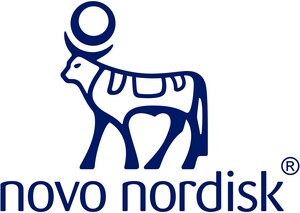Faster-acting insulin aspart versus NovoRapid® (insulin aspart) in a basal-bolus regimen: significantly reduces HbA1c in type 1 diabetes and has a comparable HbA1c reduction in type 2 diabetes
LONDON, June 13, 2016 /PRNewswire/ --
This press release is intended for UK medical and trade media only.
Abstracts: 293-OR, 240-OR
Full results from onset 1 and onset 2-the phase 3a trials assessing the use of faster-acting insulin aspart in people with type 1 diabetes (onset 1) and type 2 diabetes (onset 2)- were presented at the 76th annual Scientific Sessions of the American Diabetes Association (ADA) in New Orleans, LA, USA. In type 1 patients, findings show that adults treated with faster-acting insulin aspart had significantly reduced HbA1c and improved postprandial glucose (PPG) control after 2-hours when compared with NovoRapid® (insulin aspart) in a basal-bolus regimen[1]. In type 2 patients, HbA1c reduction was comparable and PPG was improved after 1-hour, but not after 2-hours with faster-acting insulin aspart, versus insulin aspart in a basal-bolus regimen[2].
In onset 1, after 26 weeks of randomised therapy, faster-acting insulin aspart showed[1]:
- Significant HbA1c reduction versus insulin aspart in adults with type 1 diabetes when dosed at mealtime (95% confidence interval [CI] -0.15 [-0.23; -0.07])
- Comparable HbA1c reduction when dosed 20 minutes after starting a meal compared with insulin aspart dosed at mealtime (95% CI 0.04 [-0.04; 0.12])
- Superior reduction in the rise of 2-hour PPG (95% CI -0.67 [-1.29; -0.04] mmol/L) versus insulin aspart
- A reduction in the 1-hour PPG increment[*] (95% CI -1.18 [-1.65; -0.71] mmol/L), a secondary supportive endpoint
In onset 2, faster-acting insulin aspart showed[2]:
- Comparable reduction versus insulin aspart in reducing HbA1c in adults with type 2 diabetes (95% CI -0.02 [-0.15; 0.10])
- A reduction in the 1-hour PPG increment[*] (95% CI -0.59 [-1.09; -0.09] mmol/L), a secondary supportive endpoint
- No significant reduction in the rise of 2-hour PPG (95% CI -0.36 [-0.81; 0.08] mmol/L)
"Improving PPG control is important in achieving HbA1c targets for patients with type 1 or type 2 diabetes. Poor control of PPG can often result in post-meal hyperglycaemia, which can have a wide-range of negative effects on patients", explained Professor David Russell-Jones, primary investigator for onset 1, Consultant Physician at the Royal Surrey County Hospital, and Professor of Diabetes and Endocrinology at the University of Surrey. "The results from onset 1 and onset 2 showed that faster-acting insulin aspart improved PPG control compared with insulin aspart; HbA1c outcomes were also significantly improved in type 1 patients and non-inferior in type 2 patients. Of particular interest was the finding that post-meal dosing of faster-acting insulin aspart was as effective as pre-meal dosing of insulin aspart in patients with type 1 diabetes, which highlights the potential physiological and lifestyle advantages of this faster insulin formulation."
In both trials, the previously reported safety and tolerability profiles of faster-acting insulin aspart and insulin aspart were confirmed. No apparent differences were identified between the two treatment groups with respect to adverse events and other safety parameters. The most commonly reported adverse event associated with faster-acting insulin aspart in the onset 1 and onset 2 studies was hypoglycaemia. No significant difference in the overall rate of severe or confirmed hypoglycaemia in people with type 1 or type 2 diabetes was identified between faster-acting insulin aspart and insulin aspart[1],[2].
NOTES TO EDITORS
About the onset 1 and onset 2 trials[1],[2]
The onset programme is a phase 3 clinical programme investigating faster-acting insulin aspart. This programme consists of four trials encompassing more than 2,100 people with type 1 or type 2 diabetes.
The onset 1 trial was a 26+26-week randomised, partially double-blind, basal-bolus, treat-to-target trial. This trial investigated faster-acting insulin aspart dosed at mealtime or 20 minutes after starting a meal versus NovoRapid® (insulin aspart) dosed at mealtime, both in combination with a basal insulin (insulin detemir) in 1,143 adults with type 1 diabetes. Only the data from the first 26 weeks were reported at the 76th annual Scientific Sessions of the ADA.
The onset 2 trial was a 26-week randomised, double-blind, basal-bolus, treat-to-target trial. This trial investigated faster-acting insulin aspart versus insulin aspart, both dosed at mealtime and in combination with a basal insulin (insulin glargine) and metformin in 689 adults with type 2 diabetes.
About faster-acting insulin aspart
Faster-acting insulin aspart is an investigational mealtime (bolus) insulin developed by Novo Nordisk for improving blood-glucose control in adults with type 1 or type 2 diabetes. Faster-acting insulin aspart is insulin aspart (NovoRapid®) in a new formulation in which two excipients have been added, a vitamin and an amino acid, to increase the initial absorption rate and foster an earlier blood-glucose lowering effect. Novo Nordisk submitted the regulatory filing for faster-acting insulin aspart in the USA on December 9, 2015, and in the EU on December 4, 2015.
About Novo Nordisk
Novo Nordisk is a global healthcare company with more than 90 years of innovation and leadership in diabetes care. This heritage has given us experience and capabilities that also enable us to help people defeat other serious chronic conditions: haemophilia, growth disorders, and obesity. Headquartered in Denmark, Novo Nordisk employs approximately 41,600 people in 75 countries and markets its products in more than 180 countries. For more information, visit novonordisk.co.uk.
-
[*]Postprandial glucose (PPG) increment is the increase in blood glucose levels after eating
Further information
Stephen Cull
+44(0)7584-447-280
scul@novonordisk.com
Mario Christodoulou
+44(0)7789-507-812
mciu@novonordisk.com
Jade McCudden
+44(0)7424-410-749
Jade.mccudden@packerforbes.com
References
- Russell-Jones D, et al. Double-blind mealtime faster-acting insulin aspart vs insulin aspart in basal-bolus improves glycemic control in T1D: the onset® 1 trial. Oral presentation at: 76th Scientific Sessions of the American Diabetes Association (ADA). June 10-14, 2016; New Orleans, LA.
- Bowering K, et al. Faster-acting insulin aspart vs insulin aspart as part of basal-bolus therapy improves postprandial glycemic control in uncontrolled T2D in the double-blinded onset® 2 trial. Oral presentation at: 76th Scientific Sessions of the American Diabetes Association (ADA). June 10-14, 2016; New Orleans, LA.





Share this article